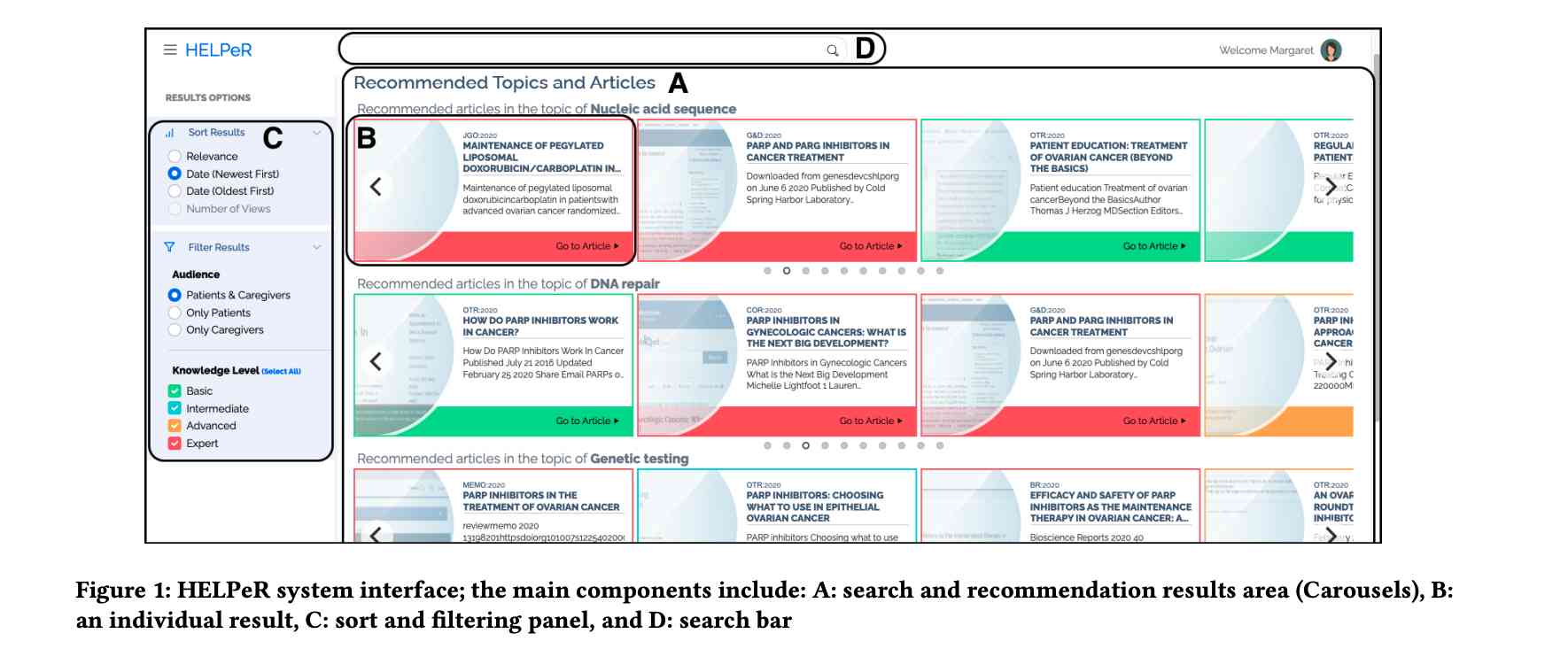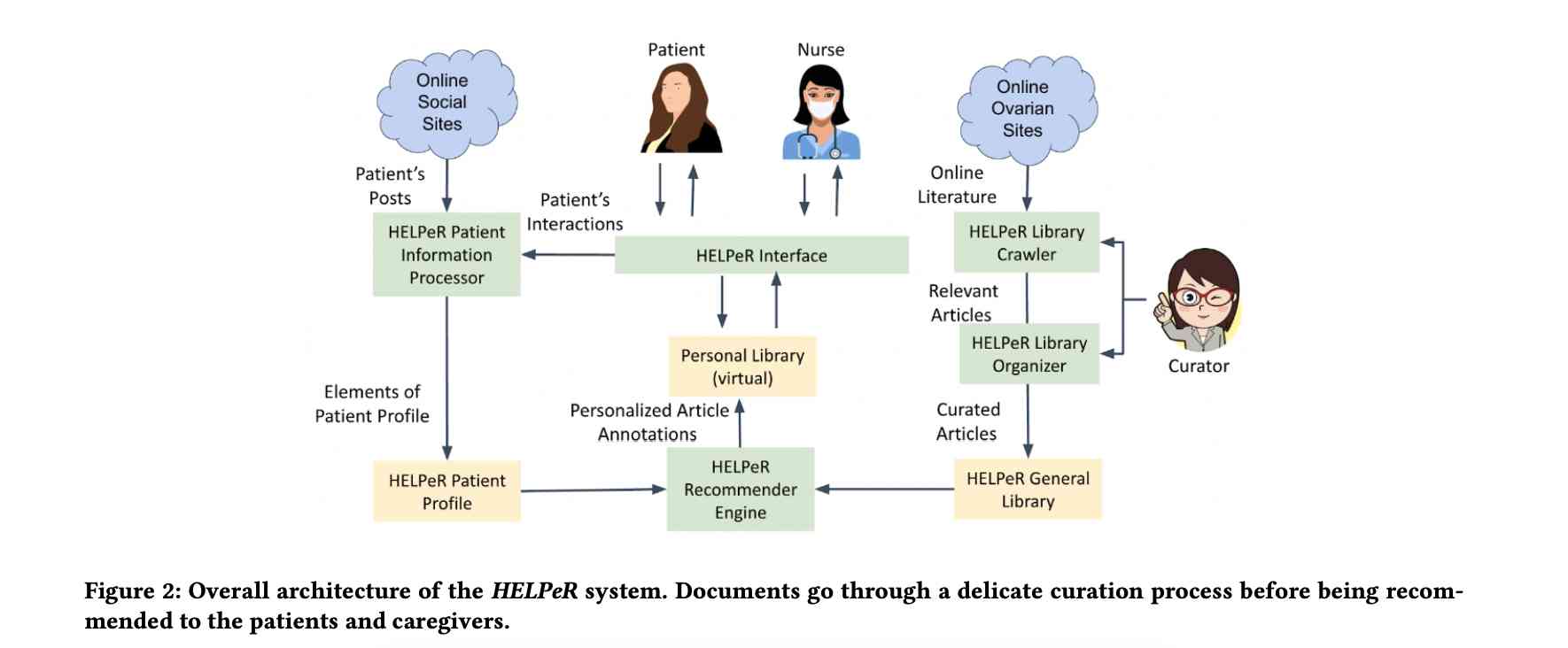HELPeR - Health e-Librarian with Personalized Recommender
Ovarian cancer, a complex and challenging disease, requires patients and caregivers to carefully review vast array of medical information to make informed health decisions. To assist in this endeavor, the project 'HELPeR: Health e-Librarian with Personalized Recommender' has been developed. This innovative system aims to empower ovarian cancer patients and caregivers by providing personalized, accessible, and up-to-date information. Recognizing the diverse health literacy levels and specific informational needs of users, HELPeR is designed to streamline the process of finding reliable, relevant, and recent resources. This system could benefit patients in a landscape where patients and caregivers often face overwhelming amounts of data, varying in quality and relevance.
At the heart of HELPeR's utility is its user-friendly interface, which allows for intuitive navigation and interaction with a vast array of resources. As depicted in Figure 1, the interface features a straightforward layout with a search bar, filtering options, and a carousel display for search results. This design is deliberately chosen to ensure ease of use and familiarity for users of all backgrounds. The system's unique feature is its ability to adapt to the user's health literacy level, highlighted by color-coded document difficulty indicators and the option to select the desired level of complexity. This personalization ensures that users are not overwhelmed by overly technical information and can access resources that match their comprehension and needs.
Underlying HELPeR’s user-centric interface is a sophisticated architecture, encapsulated in Figure 2, which is composed of three primary pipelines: document collection, user profiling, and presentation. The document collection pipeline is dedicated to curating current and credible information, while the user profiling pipeline leverages data from health providers and patient activities to create detailed user profiles. These profiles then inform the presentation pipeline, ensuring that the system delivers the most relevant and personalized content. Built on a native graph database, HELPeR offers quick and responsive interactions, making it an efficient tool for users seeking specific information. This system not only bridges the information gap for ovarian cancer patients and caregivers but also sets a precedent in health informatics by providing a tailored, interactive, and adaptive platform for medical information dissemination.
This project is funded by NIH through the National Library of Medicine by grant R01-LM013038-02 (2019 - 2023).
Contents
Research Team
This project is a collaboration between the School of Nursing and the School of Computing and Information, University of Pittsburgh.
School of Computing and Information
- PI: Daqing He, Peter Brusilovsky
- Graduate researchers: Behnam Rahdari, Khushboo Thaker, Zhenmin Hong, Mohammad Hassany
School of Nursing
- PI: Young Ji Lee, Heidi Donovan
- Postdoctoral researchers: Susan Birkhoff, Leah Rosenblum
- Graduate researchers: Yu Chi, Vivian Hui, Youjia Wang
University Library System
SP: Mary Lou Klem
Systems
Project Home Page
For a detailed description of our vision and goals, see the home page of the project
Publications
- Chi, Y., Thaker, K., He, D., Hui, V., Donovan, H., Brusilovsky, P., and Lee, Y. J. (2022) Knowledge Acquisition and Social Support in Online Health Communities: Analysis of an Online Ovarian Cancer Community. JMIR Cancer 8 (3), e39643.
- Rahdari, B., Brusilovsky, P., He, D., Thaker, K., Luo, Z., and Lee, Y. J. (2022) Helper: an interactive recommender system for ovarian cancer patients and caregivers. In: Proceedings of 16th ACM Conference on Recommender Systems, Seattle, WA, ACM, pp. 644-647.
- Thaker, K., Chi, Y., Birkhoff, S., He, D., Donovan, H., Rosenblum, L., Brusilovsky, P., Hui, V., and Lee, Y. J. (2022) Exploring Resource-Sharing Behaviors for Finding Relevant Health Resources: Analysis of an Online Ovarian Cancer Community. JMIR Cancer 8 (2), e33110.
- Chi, Y., Hui, V., Kunsak, H., Brusilovsky, P., Donovan, H., He, D., and Lee, Y. J. (2024) Women with ovarian cancer’s information seeking and avoidance behaviors: an interview study. JAMIA open 7 (1), ooae011.


